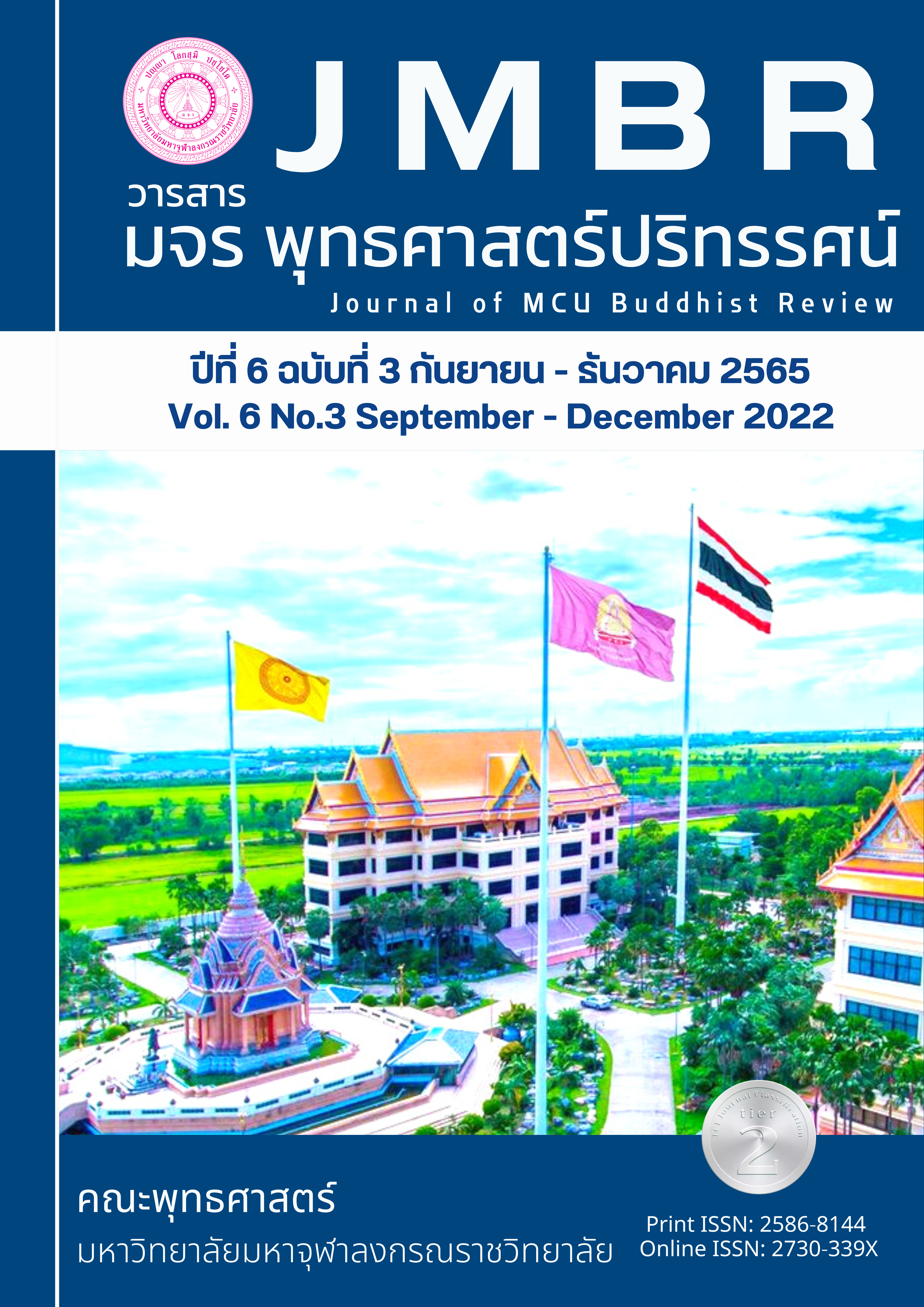แนวทางการประยุกต์หลักพุทธธรรมเพื่ออนุรักษ์และพัฒนา ระบบนิเวศตามแนวพระไตรปิฎก
Main Article Content
บทคัดย่อ
บทความวิจัยนี้มีวัตถุประสงค์ 3ประการ คือ (1) เพื่อศึกษาระบบนิเวศและนิเวศวิทยาในพระไตรปิฎก (2) เพื่อศึกษาแนวทางการอนุรักษ์และพัฒนาระบบนิเวศตามแนวพระไตรปิฎก (3) เพื่อศึกษาแนวทางการประยุกต์หลักพุทธธรรมเพื่อพัฒนาระบบนิเวศตามแนวพระไตรปิฎก ผลการวิจัยพบว่า
1) นิเวศวิทยาเป็นการศึกษาความสัมพันธ์ของสิ่งมีชีวิตกับปัจจัยแวดล้อมทั้งที่เป็นสิ่งมีชีวิตและไม่มีชีวิต ในทางพระพุทธศาสนาพระพุทธเจ้าทรงให้ความสำคัญกับระบบนิเวศเป็นอย่างมาก เพราะเป็นสถานที่ที่ภิกษุสงฆ์ใช้เป็นที่ปฏิบัติศาสนากิจและเป็นที่อยู่อาศัย โดยทั่วไประบบนิเวศมี 3 ระบบ ได้แก่ ระบบนิเวศบนบก ในน้ำ และในอากาศ
2) แนวทางการอนุรักษ์และพัฒนาระบบนิเวศตามแนวพระไตรปิฎก พระองค์ทรงกำหนดแนวทางในรูปแบบการอนุญาตและข้อห้าม
3) แนวทางการพัฒนาระบบนิเวศตามแนวพระไตรปิฎกนั้นต้องอาศัยหลักธรรมที่เป็นพื้นฐานในการพัฒนาตนเองและสังคมมาประยุกต์ใช้โดยนำสภาพแวดล้อมของระบบนิเวศบนบก ในน้ำ และในอากาศที่เหมาะสมและสอดคล้องกับหลักธรรมในหลักภาวนา 4 และหลักสัปปายะ 7 มาเป็นเครื่องมือช่วยสนับสนุนการอนุรักษ์และพัฒนาระบบนิเวศ หลักธรรมในพระพุทธศาสนาจึงเป็นส่วนหนึ่งของระบบนิเวศ เพราะพระพุทธศาสนามีพระสงฆ์เป็นผู้นำทางในการที่ช่วยอนุรักษ์และพัฒนาระบบนิเวศจากที่เสื่อมโทรมให้อุดมสมบูรณ์ หรือที่อุดมสมบูรณ์และดีอยู่แล้วให้ดำรงอยู่และเจริญมากขึ้น
Article Details

อนุญาตภายใต้เงื่อนไข Creative Commons Attribution-NonCommercial-NoDerivatives 4.0 International License.
- บทความที่ได้รับการตีพิมพ์เป็นลิขสิทธิ์ของวารสาร มจร พุทธศาสตร์ปริทรรศน์
- ข้อความใดๆ ที่ปรากฎในบทความที่ได้รับการตีพิมพ์ในวารสาร ถือเป็นความรับผิดชอบของผู้เขียนบทความ และข้อคิดเห็นนั้นไม่ถือว่าเป็นทัศนะและความรับผิดชอบของกองบรรณาธิการวารสาร มจร พุทธศาสตร์ปริทรรศน์
เอกสารอ้างอิง
ขวัญชัย พิมพ์พะนิตย์. (2562). การส่งเสริมความสามารถในการแก้ปัญหาทางวิทยาศาสตร์ วิชาชีวิวิทยาเรื่องระบบนิเวศ ของนักเรียนชั้นมัธยมศึกษาปีที่ 6 โดยการจัดการเรียนรู้ตามแนวคิดสะเต็มศึกษา. วิทยานิพนธ์ศิลปศาสตรมหาบัณฑิต สาขาวิชาการสอนวิทยาศาสตร์. บัณฑิตวิทยาลัย: มหาวิทยาลัยรังสิต.
จักรพรรณ วงศ์พรพวัณ. (2561). นิเวศวิทยาเชิงพุทธกับแนวคิด คุณค่า และการเสริมสร้างการอนุรักษ์ป่าชุมชนในจังหวัดขอนแก่น. รายงานการวิจัย. มหาวิทยาลัยมหาจุฬาลงกรณราชวิทยาลัย วิทยาเขตขอนแก่น
จิราภรณ์ คชเสนี และ นันทา คชเสนี. (2552). นิเวศวิทยาประยุกต์ : การจัดการสิ่งแวดล้อมทรัพยากรและการพัฒนาที่ยั่งยืน. พิมพ์ครั้งที่ 3. กรุงเทพมหานคร: สำนักพิมพ์แห่งจุฬาลงกรณ์มหาวิทยาลัย.
ธนู แก้วโอภาส. (2549). ศาสนาโลก. พิมพ์ครั้งที่ 3. กรุงเทพมหานคร: สำนักพิมพ์สุขภาพใจ.
นิตยา เลาหะจินดา.(2546). นิเวศวิทยาพื้นฐานสิ่งแวดล้อมศึกษา. กรุงเทพมหานคร: มหาวิทยาลัยเกษตรศาสตร์.
พระธรรมโกศาจารย์ (พุทธทาส อินฺทปญฺโญ). (2535). พระสงฆ์กับการอนุรักษ์ป่า. นิตยสารเสขิยธรรม ปีที่ 2 9(2) : 18.
พระพรหมคุณาภรณ์ (ประยุทธ์ ปยุตฺโต).(2532). การศึกษาที่สากลบนพื้นฐานแห่งภูมิปัญญาไทย. กรุงเทพมหานคร: อมรินทร์พริ้นติ้งกรุ๊พ.
พระพรหมคุณาภรณ์ (ประยุทธ์ ปยุตฺโต). (2539). ธรรมกับการพัฒนาชีวิต. พิมพ์ครั้งที่ 2. กรุงเทพมหานคร: มูลนิธิพุทธธรรม.
พระพรหมคุณาภรณ์ (ประยุทธ์ ปยุตฺโต). (2550). ศึกษาฝึกฝนพัฒนาตนให้สูงสุด. พิมพ์ครั้งที่ 4. กรุงเทพมหานคร: พิมพ์สวย.
พระพรหมคุณาภรณ์ (ประยุทธ์ ปยุตฺโต). (2551). พจนานุกรมพุทธศาสน์ ฉบับประมวลศัพท์. พิมพ์ครั้งที่ 11. กรุงเทพมหานคร: บริษัท เอส. อาร์. พริ้นติ้ง แมส โปรดักส์ จำกัด.
พระพรหมคุณาภรณ์ (ประยุทธ์ ปยุตฺโต).(2557). พจนานุกรมพุทธศาสตร์ ฉบับประมวลธรรม. พิมพ์ครั้งที่ 27. กรุงเทพมหานคร: โรงพิมพ์มหาจุฬาลงกรณราชวิทยาลัย.
พระเมธีธรรมาภรณ์ (ประยูร ธมมจิตโต). (2538). ธรรมะกับการอนุรักษ์สิ่งแวดล้อม. กรุงเทพมหานคร: โรงพิมพ์ บริษัท สหธรรมิก จำกัด.
มหาจุฬาลงกรณราชวิทยาลัย. (2539). พระไตรปิฎกภาษาไทย ฉบับมหาจุฬาลงกรณราชวิทยาลัย. กรุงเทพมหานคร: โรงพิมพ์มหาจุฬาลงกรณราชวิทยาลัย.
สมภาร พรมทา. (2541). ศีลธรรมกับกฎหมายมุมมองจากพุทธศาสนา. พุทธศาสน์การศึกษา. จุฬาลงกรณ์ มหาวิทยาลัย, ปีที่ 5 2-3(2): 3-57.
เสรีวัฒน์ สมินทร์ปัญญา. (2539). นิเวศวิทยา:สิ่งแวดล้อมกับการปรับปรุงความเป็นอยู่ของมนุษย์. กรุงเทพมหานคร: สำนักพิมพ์โอเดียนสโตร์.
สำนักงานคณะกรรมการสิ่งแวดล้อม. (2530). ความรู้เรื่องสิ่งแวดล้อม. พิมพ์ครั้งที่ 2. กรุงเทพมหานคร: บริษัท เอศโซ่สแตนด์ดาร์ด ประเทศไทย จำกัด.
อู่แก้ว ประกอบไวทยกิจ บีเวอร์. (2531). มนุษย์-ระบบนิเวศน์และสภาพนิเวศน์ในประเทศไทย. กรุงเทพมหานคร: ไทยวัฒนาพาณิชย์.


